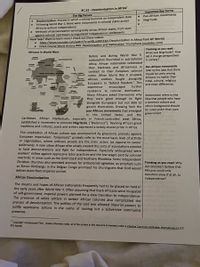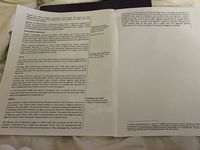Question
What is decolonization in Africa?
What is the big picture of decolonization in Africa?

Transcribed Image Text:O AND
3C.52 - Decolonization in Africa
Important Key Terms
Pan-African movements
Negritude
The Big Picture
Decolonization: Process in which a colony becomes an independent state.
Following World War II, there were movements in colonial states across
Africa to achieve independence.
Methods of decolonization varied greatly across African states, from wars
against colonial oppressors to negotiated independence settlements.
Need help? Want to learn more? Check out these videos:
• https://www.youtube.com/watch?v=wYBLmWwfsT4A (Decolonization in Africa from AP World)
Crash Course World History #40: Decolonization and Nationalism Triumphant (youtube.com)
Thinking as you read:
What was Negritude? How
Africans in World Wars
Before and during World War II, did it change perspectives
nationalism flourished in sub-Saharan in society?
Africa. African nationallsts celebrated
their blackness and Africanness in Pan-African movements
MOROOCO
AMEVTENMARN NA
EDERIA
LYA
SAARA
TRIPOL
O
DE ORO
contrast to their European colonial refer to the idea that there
rulers. When World War II erupted, should be unity among
soldiers fought alongside Africans no matter their
Europeans to "defend freedom." This tribal, cultural, religious
further
FRENCH WIERWE AFWICA WRIE
EITREA FREENCH
BOMALILAND
ANLO
EOPTIAN
SUDAN
FRENCH
BUO
BITIH
SOMALAND
ETHOPIA
PORT
NIGERIA
CAMES
TALIAN
and other differences.
LEDNE
T MALLAND
EAST AFRICA
CONGO
FREE STATE
OELOAN
CONGO
experience
encouraged
VORY
CDAST
CDAST
Co O
GERMAN
EAST AFRICA
resistance
to colonial domination.
ATLANTC
COEAN
Many Africans asked themselves why Nationalism refers to the
they were good enough to fight idea that people who have
alongside Europeans but not able to
govern themselves. Drawing from the
pan-African movements that emerged be ruled under their own
in the
ANGOLAOETHEN
NORTHERN
RHOOESIA
PORTUGES
EAST APRICA
a common culture and
ethnic background should
SOUTERN
GERMAN
OUTH WEST RHODESIA
AFRICA
MADAGACA
government.
and the
Caribbean, African intellectuals, especially in French-controlled west Africa,
established a movement to promote Négritude ("Blackness"). Reviving Africa's great
traditions and cultures, poets and writers expressed a widely shared pride in Africa.
United States
This celebration of African culture was accompanied by grassroots protests against
European imperialism. "Grassroots" protests refer to the most basic level of activity
or organization, where ordinary people are the main actors (as oppose to career
politicians). A new urban African elite slowly created the sorts of associations needed
to hold demonstrations and fight for independence. Especially widespread were
workers' strikes against oppressive labor practices and the low wages paid by colonial
overlords in areas such as the Gold Coast and Northern Rhodesia. Some independent
Christian churches also provided avenues for anticolonial agitation, as prophets such Thinking as you read: Why
as Simon Kimbangu in the Belgian Congo promised his churchgoers that God would Africans could only
deliver them from imperial control.
did colonizers believe that
transition slow, if at all, to
independence?
African Decolonization
The dreams and hopes of African nationalists frequently had to be placed on hold in
the early years after World War II. Often assuming that black Africans were incapable
of self-government, imperial powers planned for a slow transition to independence.
The presence of white settlers in certain African colonies also complicated the
process of decolonization. The politics of the cold war allowed imperial powers to
justify oppressive actions in the name of rooting out a subversive communist
presence.
'Copyright Achievement First. Unless otherwise noted, all of the content in this resource is licensed under a Creative Commons Attribution Internationall 4.0 (CC
BY) license

Transcribed Image Text:became Independent in 1957, but independence came much later to Angola (1975S)
violent, and decolonization occurred at a different pace in different nations. Ghana
and Zimbabwe, formerly Southern Rhodesia (1980)
Despite the delays, however, sub-Saharan states slowly but surely won their
independence as each newly independent nation inspired and often aided other
Agitation for independence in sub-Saharan Africa took on many forms, peaceful and
1055 when the FLN moved into more urbanized areas. In an attack on the town of
Canstantine, the FLN killed dozens of French settlers. France sent thousands of troops
to Algeria to put down the revolution, and by 1958 it had committed half a million
ddien to the war. The war became ugly: Algerians serving with the French had to
kill fellow Algerians or be killed by them; Algerian civilians became trapped in the
crossfire of war, often accused of and killed for alding FLN guerrillas; thousands of
French soldiers died. By the war's end in 1962, when the Algerians gained
Independence from France, hundreds of thousands of Algerians had diled.
lands to wvin their freedom.
in sub-Saharan Africa took on any forms, peaceful and
na zimbabwe, formerly Southern Rhodesia (1980)
Ghana (British Gold Coast)
Thinking as you read:
What was the significance
of Kwame Nkrumah for
Ghana? For Africa?
l nas successfully achieved its freedom from British rule in 1957. Under the
aership of Kwame Nkrumah (1909-1972), political parties and strategies for mass
action took shape. Although the British subjected Nkrumah and other nationalists to
Jan terms and repressive control, gradually they allowed reforms and negotiated the
transfer of power in their Gold Coast colony.
Kw4-me N-kru-ma
Arter it became independent in 1957, Ghana inspired other African nationalist
movements. Nkrumah, as a leader of the first sub-Saharan African nation to gain
independence from colonial rule, became a persuasive spokesperson for pan-African
unity, a movement for unifying African people. His ideas and his status as an African
leader symbolized the changing times in Africa
Thinking as you read: Who
were the Mau Mau? Who
was Jomo Kenyatta?
Kenya
The British ruled Kenya, and many British settlers resisted Kenyan Independence-
especially those who had taken over prize farmland in the northern highlands of the
country.
The Mau Mau (MOW mow) resisted British rule. They were made up mostly of
native Kenyan farmers forced out of the mountains by the British settlers. Using
guerrilla war tactics, the Mau Mau wanted to push the white farmers into leaving the
highlands.
The British moved to suppress all nationalist groups and jailed Kenya nationalist
leaders, including Jomo Kenyatta (1895-1978) in 1953. During growing resistance to
colonial rule, the British mounted major military offenses against rebel forces,
supporting their army troops with artillery, bombers, and jet fighters. By 1956 the
British had effectively crushed all milltary resistance in a conflict that claimed the
lives of twelve thousand Africans and one hundred Europeans.
In 1959 the British lifted the state of emergency, and as political parties formed,
nationalist leaders like Kenyatta reemerged to lead those parties. By December 1963
Kenya had negotiated its independence.
Thinking as you read:
What methods were used
Algeria
French settlers in Algeria demanded that the government in Paris maintain control of in Algerian decolonization?
the territory. Two million white French settled or were born in Algeria (Northern
Africa) by the mid-1940s. The end of World War II, however, marked the beginning of
a revitalized nationalist movement in Algeria, fueled by desire for independence from
France and freedom from domination by white settlers. The event that touched off
the Algerian revolt came in May 1945. In the resulting riots more than eight thousand
Algerian Muslims died, along with approximately one hundred French.
The Algerian war of liberation began in 1954 under the command of the Front de
Libération Nationale (FLN, or National Liberation Front). The FLN adopted guerrilla
warfare. The French did not realize the serlousness of the challenge they faced until
2 This text French Revolution' is a revision of "Traditions and Encounters by Jerry H. Bentley and Patter-
First does not own the copyright in Traditions and Encountern and Pattems of Interactions and caima no
exclusively for non-profit educational purposes under tair use principles irn US Copyright law The user
may be used under fair use / tair dealing permissions in the user's country.
Expert Solution
This question has been solved!
Explore an expertly crafted, step-by-step solution for a thorough understanding of key concepts.
This is a popular solution
Trending nowThis is a popular solution!
Step by stepSolved in 2 steps
